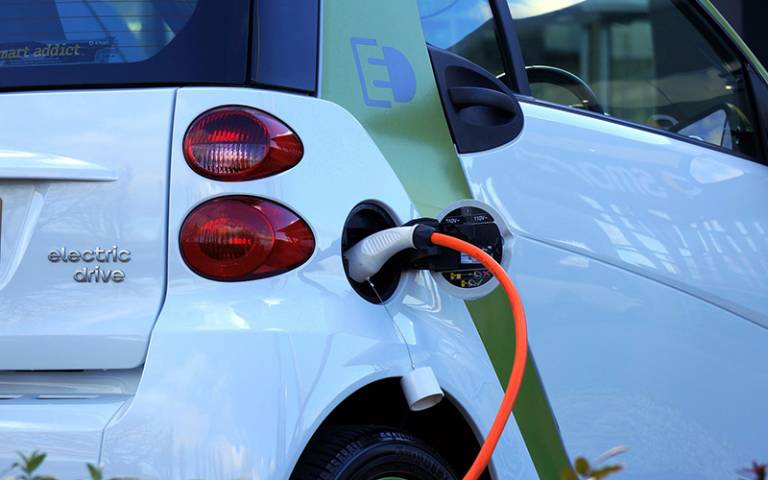The Faraday Institution Announces £42 Million for Energy Storage Research
6 February 2018

- Four projects awarded to ignite a revolution in UK battery research, and address battery challenges faced by industry.
- The Faraday Institution, a registered charity, is funded in part through government’s £246 million investment in battery technology as part of the Industrial Strategy.
On January 23, 2018, the Faraday Institution announced up to £42 million in new government funding to four UK-based consortia to conduct application-inspired research aimed at overcoming battery challenges to accelerate the electric vehicle (EV) revolution.
If successful, this research will put the UK on the map as being at the forefront of battery technology worldwide. It has the potential to radically increase the speed with which we are able to make the move to electric vehicles, as well as the speed with which we can decarbonize our energy supply, with obvious benefits to the environment.
The Faraday Institution is the UK’s independent national battery research institute, and was established as part of the government’s £246 million investment in battery technology through the Industrial Strategy. Its formation was announced in October 2017 by the Business Secretary Greg Clark.
The Faraday Institution’s goal is to make the UK the go-to place and world leader for battery technology research and it has a clear mission to ensure the UK is well placed to take advantage of the future economic opportunities from this emerging technology.
Business Minister Richard Harrington said:
" “With 200,000 electric vehicles set to be on UK roads by the end of 2018 and worldwide sales growing by 45 per cent in 2016, investment in car batteries is a massive opportunity for Britain and one that is estimated to be worth £5 billion by 2025. Through our flagship Industrial Strategy and its Future of Mobility and Clean Growth Grand Challenges, we are committed to making Britain the ‘go-to’ destination for the development and deployment of this game-changing technology. Government investment, through the Faraday Institution, in the projects announced today will deliver valuable research that will help us seize the economic opportunities presented by battery technology and our transition to a low-carbon economy.”
The electrification of vehicles in the UK presents significant economic, social and environmental opportunities as highlighted by the new Industry Strategy. To achieve the translation from combustion technology to electrification of the vehicle fleet requires a coordinated approach from basic research to industrialisation: the Faraday Challenge is the UK’s strategic investment in the area, of more than £240M over the next three years.
UCL were partners in the establishment of the Faraday Institution, the basic research arm of the Faraday Challenge, which is coordinating research programmes across a range of challenges relating to energy storage for electric vehicles.
The Electrochemical Innovation Lab (EIL) have coordinated UCL Chemical Engineering’s involvement in these research challenges. The total value of these awards to UCL Chemical Engineering will be £3.675M. The EIL has secured three successful projects partnership with consortia from UK academia and industry, which were announced last week:
- Tackling battery degradation: to understand performance loss in battery systems in response to a range of external stimuli.
- Multi-scale modelling: to develop and apply validated simulations to predict performance from the atomic to the systems level.
- Solid state batteries: to develop new materials and processes for a next generation battery chemistry.
Dr Paul Shearing says:
" “The EIL is participating in three large research projects which bring together consortia of the UK’s leading academic and industry partners to tackle some of the major challenges in batteries for vehicle electrification. This builds on extensive research activity already underway in the EIL and consolidates our position as a leading hub for battery research.”
Prof Dan Brett says:
" “Following the award of three industrial Faraday Challenge project earlier in the year, these projects offer the opportunity to straddle fundamental to applied research that will underpin development of the next generation of batteries. These projects will also act as a springboard for the recently established UCL Advanced Propulsion Lab (APL) to build capabilities in battery research ahead of the UCLEast labs coming online in 2022.”
EIL is a multidisciplinary activity to accelerate impact, innovation, enterprise and research in electrochemical science and engineering. The Advanced Propulsion Lab (APL) represents a unique facility that combines world class research into advanced vehicles and mobility systems, innovative laboratory teaching, outreach and commercial enterprise. The APL (now based at the UCL Bloomsbury Campus) will be one of the first engineering themes in UCLEast.
For more information on The Faraday Institution, visit faraday.ac.uk.
 Close
Close



